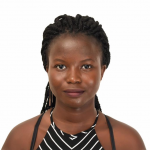
2021
|
|
Why did you choose to do a PhD?
I chose to pursue a PhD program to fulfill my career goals of becoming an academic researcher. I was drawn to contribute new knowledge on wound care materials that fight against resistant infections and improve chronic wound healing.
Why did you choose to do graduate education at NUS? If you received offers from other universities, why did you pick NUS?
NUS provided the world-class research facilities for me to conduct pharmaceutical research. It also provided a competitive environment that enabled me grow as a researcher and compete internationally. Given the vibrant and exciting campus life, I had the opportunity to forge life-long relationships with other students from all over the world. Most importantly, the department of pharmacy provided a supportive environment and I was drawn to the lab of my advisor, A/P Rachel Ee, whose research was exciting to me.
Briefly share about your research or thesis (i.e. dissertation topic for Masters by Coursework students).
During my PhD, my research focused on the development of anionic hydrogel systems for the delivery of antimicrobial peptides. In addition to my main project, I had the opportunity to explore my own ideas as well as collaborate with other group members on antimicrobial systems.
On hindsight, would you have chosen the same research supervisor for your graduate programme?
Yes. I really enjoyed my graduate journey in Prof Ee’s lab. I gained an all round research experience and a myriad of interdisciplinary skills that allowed me to compete internationally. I was well supported within the lab and had access to all equipment and resources that I needed or proposed for my work. I believe the 4 years’ graduate experience I had in my supervisor’s lab was the best any student could have had and I am eternally grateful to her for all her support till date.
Academic Activities
Taking my graduate training in Prof. Ee’s lab very seriously, I focused extensively on improving my technical, writing and mentoring skills. For instance, during my PhD, I had the opportunity to mentor about 10 junior students (including PSRP, SRP and FYP and international exchange students). I also utilised the opportunities within the university to serve on several committees (NUS Pharmacy Graduate Committee, Graduate Scientific Congress Committee, residential leaders). These activities improved my communication, supervisory and organization skills. I had conference support within the department and in my lab to present my work via posters/oral presentations. Finally because senior research members were very generous at the beginning of my PhD to train me I was able to value collaboration in research. Through this, I was well prepared to compete for research grants/awards during and at the end of my study. I was selected as an Otto Bayer Fellow, Marie Curie Fellow and Best graduate researcher during my stay in NUS.

